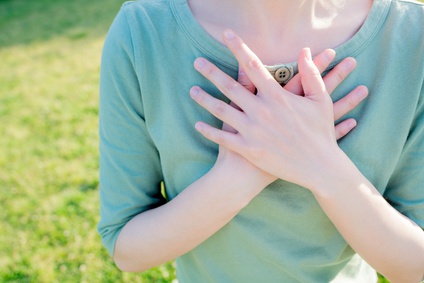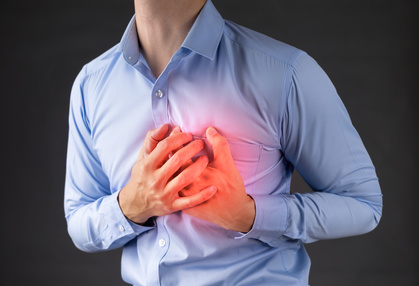Chest Pain After Eating – Causes When Eating, After Meals
Chest pain after eating or while eating is not an uncommon symptom. It may be as a result of swallowing larger than normal-sized bites, excessively hot food or drinks or due to acute acid reflux that occurs occasionally. In most of these cases, the pain is short-lived, does not increase in intensity and other signs or symptoms do not arise.
However, recurrent chest pain after meals or when eating should be investigated, especially if it is associated with one or more of the following features :
- Shortness of breath
- Crushing pain that intensifies and does not respond to antacids
- Dizziness or fainting
- Severe nausea
- Vomiting, especially projectile vomiting or bloody vomitus
- Intense abdominal pain
Most of these situations should prompt the need for medical attention. Although gastrointestinal conditions are the more common causes of chest pain after eating, high risk patients should be aware of the difference between cardiac and non-cardiac chest pain.
Causes of Chest Pain After Eating or With Meals
Most of the causes of chest pain after eating is related to the esophagus. This is the long tube that runs from the throat down to the stomach in the abdominal cavity. It runs close to the heart and it is not uncommon for esophageal pain to be mistaken for cardiac pain and vice versa. Therefore chest pain from any cause, irrespective of whether it occurs after meals or not, should be investigated by a medical professional.

Digestive Causes
There are several possible causes of chest pain after meals but acid reflux is by far the most common. This is where stomach acid flows into the esophagus. However, conditions of some other digestive organs like the stomach or gallbladder can also be responsible.
Acid Reflux and GERD
Acid reflux causes a burning chest pain (heartburn) with other symptoms like mild nausea, regurgitation (not vomiting), water brash occasionally and stomach bloating. Chronic cases of acid reflux, which is also known as gastroesophageal reflux disease (GERD), and can lead to a number of complications if left untreated.
In acute cases, acid reflux may result in chest pain after eating large meals, lying flat or exercising after eating, and drinking alcohol. In chronic GERD, the pain may be constant, aggravated by the factors just mentioned and often worse at night when sleeping.
Other Digestive Causes
- Esophageal ulcer: A consequence of GERD and occasionally H.pylori infection, the erosion in the lining of the esophagus often causes constant chest pain that is worse during eating. Other complications of long standing GERD or H.pylori infection like esophageal cancer or Barrett’s esophagus may also be responsible.
- Achalasia: Failure of the lower esophageal sphincter (LES) to relax causes food to accumulate in the esophagus (gullet). Other esophageal motility disorders may also be responsible for chest pain during and after meals.
- Esophageal tear: Rupture of the esophagus causes severe pain which will be present even without eating. Attempting to eat or swallow will often exacerbate the pain, and the rupture may occur due to vomiting after eating. A rupture is a medical emergency.
- Gastritis and peptic ulcer: Due to the location of the stomach and duodenum, pain may be perceived in the lower part of the chest after eating in gastritis and peptic ulcers. Hyperacidity conditions like Zollinger-Ellison syndrome may also cause pain in the duodenum.
- Hiatal hernia: This is a protrusion of portion of the stomach through the diaphragmatic opening which becomes wider than normal. Pain is often aggravated during eating and persists after meals, only to ease once the stomach is empty.
- Intestinal obstruction: An obstruction in the upper gut (stomach or small intestine) may cause food to back up in the esophagus. This may lead to severe nausea and projectile vomiting after eating.
- Biliary tract and gallbladder disease: Gallstones lodged in the bile duct (bile duct stones) may block the flow of bile after eating and elicit pain. Other causes may include cholangitis and biliary sclerosis. The pain may be worse after eating fatty foods.
- Pancreatitis: This typically results in pain after eating which may be felt in the lower chest or upper middle abdomen. Pain may radiate to the superior parts of the chest, lower down to the abdomen or to the back. Acute pancreatitis is more likely to occur after bouts of excessive alcohol consumption.
Distension of the stomach after a meal may cause pressure on surrounding structures leading to :
Cardiac Causes
In patients with cardiovascular conditions or those at risk of cardiac conditions, pain after eating could be related to angina pectoris. A burning chest pain, or tight, crushing or stabbing pain may be reported. Other symptoms may include shortness of breath, dizziness and nausea.
If sweating, fainting and radiation of the pain to the left arm, jaw, neck, or back is also present, then it may be a myocardial infarction (heart attack) and immediate medical attention is necessary. The difference between angina and a myocardial infarction is described further under angina and heart attack pain.

Other Cardiac Causes
- Pericarditis: This is inflammation of the lining around the heart known as the pericardium. It can occur for several reasons like viral infections and after injury or surgery to the chest. Breathing in deeply can worsen the pain and sitting up or leaning forward may reduce the pain.
- Myocarditis: The myocardium is the largest part of the heart wall and can become inflamed. It is more likely to be associated with infections, medication and certain chemicals.
- Thoracic aorta dissection: This is where a tear forms in the wall of the aorta, specifically the thoracic part of the aorta which lies in the chest. It is a serious condition with potentially life threatening complications. It can cause a sudden severe chest pain that may radiate to the neck.
Respiratory Conditions
A number of respiratory causes may also cause chest pain. Conditions of the lower trachea, bronchi, lungs or pleura (lining around the lungs) commonly cause chest pain but this is usually not aggravated by eating or specifically after a meal. Asthma, bronchitis, bronchiectasis, lung cancer, pleuritis and pneumonia are some of the respiratory causes of chest pain.
Last updated on September 27, 2018.





